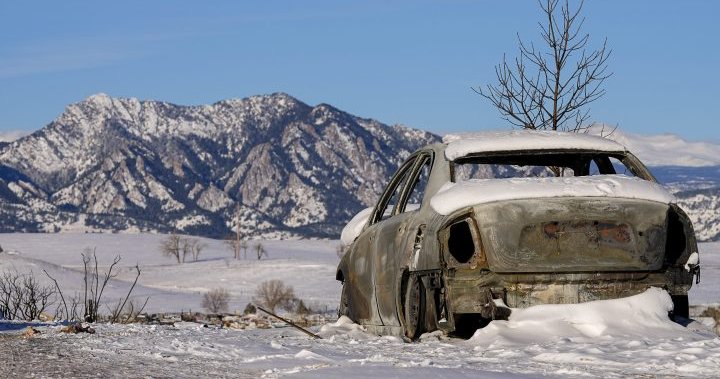
Colorado wildfire: Search continues for missing 2 after massive blaze
Global News
The flames ripped through at least 9.4 square miles and left nearly 1,000 homes and other buildings destroyed in suburbs between Denver and Boulder.
Search teams looked for two missing people on Sunday in the snow-covered but still smoldering debris from a massive Colorado wildfire, while people who barely escaped the flames sorted through what was left after the blaze and investigators tried to determine its cause.
The flames ripped through at least 9.4 square miles (24 square kilometers) and left nearly 1,000 homes and other buildings destroyed in suburbs between Denver and Boulder. It came unusually late in the year following an extremely dry fall and amid a winter nearly devoid of snow. Experts say those conditions, along with high winds, helped the fire spread.
In hard-hit Louisville, Susan Hill walked her dog in the well-below freezing chill Sunday morning down a snowy street. She choked up as she remembered three days ago seeing the sky change color from the hill where she used to watch fireworks – and then the nervous sprint out of town with her college-age son and the dog, cat and the fire box with birth certificates and other documents.
The flames stopped about 100 yards (90 meters) from her property, and she slept Saturday night in her home using a space heater and hot water bottles to stay warm since her natural gas service had not been turned back on.
“I don’t even know how to describe it,” she said. “It’s so sad. It’s so awful. It’s just devastating.”
In the burned-out neighborhood near Hill’s home, a U.S. Mail carrier checked the still-standing brick and stone boxes for outgoing mail. The fire came so quickly people might have put bills or other letters in there, and she didn’t want someone to steal them.
While homes that burned to the foundations were still smoldering in some places, the blaze was no longer considered an immediate threat – especially with Saturday’s snow and frigid temperatures.
“A day late and a dollar short,” Hill said of snow, which scientists said typically prevents winter fires that spread in dry grass.










